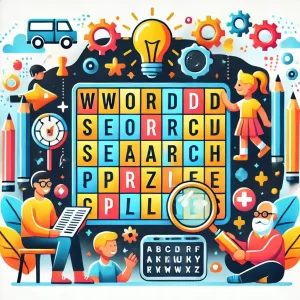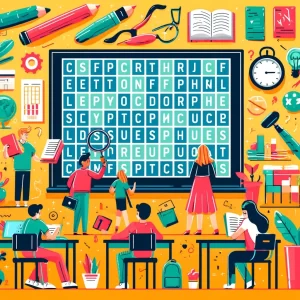Unlock the Power of Word Search Puzzles: A Comprehensive Introduction
Introduction
Word search puzzles are engaging games where a grid of letters hides words to be found. Players must locate these words horizontally, vertically, or diagonally within the grid, challenging their observational skills and vocabulary.
The first word search puzzle is believed to have been created by Norman Gibat in 1968, appearing in the Selenby Digest in Norman, Oklahoma. Since then, word searches have gained popularity worldwide and can be found in various publications, books, and online platforms.
Word search puzzles have a broad appeal across different age groups. Children enjoy them as a fun way to learn new words, while adults find them relaxing and mentally stimulating. They are often used in educational settings to reinforce learning and improve language skills.
In the next chapter, we will delve into the cognitive and educational benefits of solving word search puzzles, exploring how they can enhance memory, focus, and critical thinking skills.
Cognitive and Educational Benefits
Memory Improvement and Enhanced Focus
Word search puzzles are not just a fun pastime; they can actually boost your memory and sharpen your focus. When you engage in solving word search puzzles, you are actively exercising your brain’s ability to recall and retain information. Finding hidden words amidst a sea of letters challenges your memory retention skills, helping you remember patterns and sequences more effectively. This constant mental stimulation can enhance your overall memory capacity and improve your ability to concentrate on tasks.
Vocabulary Enrichment and Language Skills Development
One of the most significant benefits of word search puzzles is their impact on vocabulary building and language skills development. By searching for words within a grid, you not only reinforce your existing vocabulary but also learn new words and their spellings. This process can be particularly beneficial for individuals looking to expand their language proficiency or for students aiming to enhance their literacy skills in a fun and engaging way.
Critical Thinking and Problem-Solving Skills
Engaging in word search puzzles requires more than just finding words; it involves critical thinking and problem-solving skills. As you scan through the grid, you need to analyze and strategize to locate words efficiently. This process encourages logical reasoning, pattern recognition, and the ability to think ahead. By regularly challenging yourself with word search puzzles, you can sharpen your analytical skills and boost your problem-solving capabilities.
Mental Health and Well-being
Stress Reduction and Relaxation
Engaging in word search puzzles can be a fantastic way to unwind and alleviate stress. The focused nature of searching for words in a grid can help distract your mind from daily worries and promote relaxation. As you immerse yourself in the puzzle, you enter a state of flow where time seems to slip away, providing a much-needed mental break.
Cognitive Decline Prevention for Seniors
For seniors, word search puzzles can play a crucial role in maintaining cognitive function and preventing decline. Regularly solving these puzzles can help keep the brain active and stimulated, potentially reducing the risk of cognitive impairment as individuals age. By exercising the brain through the challenges presented in word searches, seniors can support their cognitive health and overall well-being.
Prevention of Neurodegenerative Diseases
Studies have suggested that engaging in mentally stimulating activities, such as word search puzzles, may contribute to a lower risk of developing neurodegenerative diseases like Alzheimer’s. The cognitive benefits gained from regularly solving these puzzles can help build a cognitive reserve that may offer some protection against the onset of such conditions.
Word search puzzles not only provide entertainment and mental stimulation but also serve as a proactive approach to safeguarding mental health and well-being. By incorporating these puzzles into your routine, you can enjoy the dual benefits of relaxation and cognitive maintenance, promoting a healthier mind as you navigate through life’s challenges.
Social and Collaborative Aspects
Group Activities and Team-Building Exercises
Word search puzzles are not only a solitary activity but can also be a fantastic way to engage in group activities and foster team-building among participants. By working together to find words hidden in the grid, individuals can enhance their communication skills, encourage teamwork, and boost morale. These collaborative puzzles promote cooperation and create a sense of unity among participants, making them ideal for team-building exercises in various settings such as schools, workplaces, or community events.
Promoting Social Interaction Across Age Groups
Word search puzzles serve as a bridge that connects people of different ages and backgrounds through a common interest. Whether it’s solving puzzles with family members, friends, or strangers, these activities encourage social interaction and provide a platform for engaging conversations. The shared experience of hunting for words fosters bonds between individuals and creates opportunities for meaningful connections, irrespective of age differences.
Intergenerational Interaction
One remarkable aspect of word search puzzles is their ability to facilitate intergenerational interaction. Grandparents can bond with grandchildren over a puzzle, exchanging knowledge and experiences while working together to decipher the hidden words. This shared activity not only strengthens family ties but also promotes understanding and empathy across generations. It’s a wonderful way to bridge the generation gap and create lasting memories.
Strategies for Solving Word Search Puzzles
Basic Techniques: Linear Scanning, Identifying Unique Letters
When tackling word search puzzles, starting with basic techniques is key to success. Linear scanning involves systematically scanning each row and column to identify words. This method helps you cover the entire puzzle efficiently without missing any hidden words. Additionally, paying attention to unique letters in a word can act as clues to locate the complete word. By focusing on uncommon letters, you can narrow down your search and uncover words more quickly.
Advanced Techniques: Pattern Recognition, Backward Search
Once you’ve mastered the basics, delve into advanced techniques to further enhance your puzzle-solving skills. Pattern recognition involves identifying common word patterns or shapes within the grid. This method allows you to anticipate where words might be located based on their structure, speeding up your search process. Another advanced technique is backward search, where you search for words in reverse order. This approach adds an extra layer of challenge and helps sharpen your cognitive abilities by requiring you to think in a different direction.
Adjusting Difficulty Levels
To keep your word search experience engaging, consider adjusting the difficulty levels of puzzles you attempt. Start with easier puzzles to build confidence and familiarity with the solving techniques. As you progress, challenge yourself with more complex grids or thematic puzzles that require a deeper level of concentration and problem-solving. Adapting the difficulty level ensures that you continue to enjoy the mental stimulation and satisfaction that word search puzzles offer.
By combining basic and advanced techniques, along with adjusting difficulty levels, you can unlock the full potential of word search puzzles and elevate your solving skills to new heights.
Integrating Word Search Puzzles in Education
Interdisciplinary Learning Across Subjects
Word search puzzles are not just fun games; they can be powerful educational tools that promote interdisciplinary learning across various subjects. Teachers can customize puzzles to include vocabulary and key terms from different disciplines, encouraging students to make connections between subjects. For example, a history-themed puzzle could incorporate terms related to geography or literature, fostering a holistic understanding of the topic.
Customizing and Creating Puzzles for Educators
Educators can tailor word search puzzles to suit their specific teaching objectives. By creating puzzles that align with lesson content, teachers can reinforce important concepts and vocabulary in a fun and engaging way. Customized puzzles can cater to different learning styles, making them a versatile resource for educators in diverse classroom settings.
Using Puzzles for Assessments and Reinforcement
Word search puzzles can serve as effective assessment tools to evaluate students’ comprehension and retention of material. Teachers can use puzzles as quizzes or homework assignments to test vocabulary knowledge or reinforce lesson material. Additionally, incorporating puzzles into review sessions can help reinforce learning outcomes and provide a playful yet informative way to assess student progress.
Practical Tips and Resources
Finding Quality Word Search Puzzles
When it comes to finding engaging and challenging word search puzzles, quality is key. Here are some practical tips to ensure you’re getting the best puzzles:
- Look for reputable puzzle books or websites that specialize in word search puzzles. These sources often provide a wide range of difficulty levels and themes to cater to different preferences.
- Check reviews and recommendations from other puzzle enthusiasts. Online forums and social media groups dedicated to puzzles can be great resources for discovering hidden gems.
- Explore puzzle apps and online platforms that offer curated collections of word search puzzles. These digital formats provide convenience and accessibility for puzzle lovers on the go.
Creating Custom Puzzles Using Online Generators
If you’re feeling creative or want to tailor puzzles to specific themes or learning objectives, online generators can be invaluable tools. Here’s how you can leverage them:
- Choose a reliable online puzzle generator that allows customization of grid size, word list, and difficulty level. This flexibility enables you to create personalized puzzles for various purposes.
- Input your desired words or phrases to generate a unique puzzle. Some generators even offer options for themed puzzles based on holidays, events, or educational topics.
- Experiment with different settings to adjust the challenge level and layout of the puzzle. Customizing puzzles ensures they align with your intended use, whether for classroom activities or personal enjoyment.
Additional Tools, Apps, and Software
Enhance your word search puzzle experience with the help of additional tools, apps, and software designed to optimize your solving skills and enjoyment:
- Utilize puzzle-solving apps that offer features like hints, timers, and progress tracking to enhance your solving efficiency and motivation.
- Explore puzzle creation software for more advanced customization options and intricate puzzle designs. These tools are ideal for educators or puzzle aficionados looking to create complex puzzles.
- Engage with online puzzle communities and forums to stay updated on the latest trends, tips, and resources related to word search puzzles. Sharing insights and strategies with fellow enthusiasts can further enrich your puzzling experience.
Conclusion
Summary of Benefits and Key Points
Word search puzzles offer a plethora of benefits that span cognitive, educational, mental health, and social aspects. From enhancing memory, focus, and critical thinking skills to promoting vocabulary enrichment, language skills development, and stress reduction, these puzzles are a versatile tool for personal growth and well-being.
Cognitive and Educational Benefits
As highlighted in previous sections, word search puzzles significantly contribute to cognitive and educational benefits. They aid in memory improvement, enhanced focus, and vocabulary enrichment, making them invaluable in educational settings and personal development.
Mental Health and Well-being
Engaging in word search puzzles not only stimulates the brain but also contributes to mental health and well-being. By offering stress relief, preventing cognitive decline in seniors, and potentially reducing the risk of neurodegenerative diseases, these puzzles are a holistic approach to maintaining cognitive function.
Social and Collaborative Aspects
Furthermore, word search puzzles foster social interaction, team-building, and intergenerational bonding. They promote communication, cooperation, and unity among participants, making them ideal for group activities across various age groups and settings.
Encouragement to Engage with Word Search Puzzles
Embrace the world of word search puzzles and unlock their full potential by sourcing quality puzzles, creating custom ones, and exploring additional tools and software for an enhanced solving experience. Connect with like-minded enthusiasts in online communities to share strategies, tips, and the joy of puzzling together.
Discover the joy of word search puzzles and reap the countless benefits they offer. Start solving today and watch your cognitive abilities, mental well-being, and social connections flourish!




